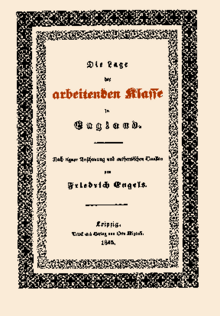The Condition of the Working Class in England
 |
|
| Author | Friedrich Engels |
|---|---|
| Original title | Die Lage der arbeitenden Klasse in England |
| Translator | Mrs. F. Kelley Wischnewetzky (Florence Kelley) |
| Country | Germany |
| Language | German |
| Genre | Politics, economics, sociology |
| Publisher | Otto Wigand, Leipzig |
|
Publication date
|
1845 in German, 1887 in English |
| Media type | Print (book) |
| ISBN | |
| Followed by | The Communist Manifesto |
The Condition of the Working Class in England (German: Die Lage der arbeitenden Klasse in England) is an 1845 book by the German philosopher Friedrich Engels, a study of the industrial working class in Victorian England. Engels' first book, it was originally written in German as Die Lage der arbeitenden Klasse in England. It was written during his 1842–44 stay in Manchester, the city at the heart of the Industrial Revolution, compiled from Engels' own observations and detailed contemporary reports.
In Condition, Engels argues that the Industrial Revolution made workers worse off. He shows, for example, that in large industrial cities such as Manchester and Liverpool, mortality from disease (such as smallpox, measles, scarlet fever and whooping cough) was four times that in the surrounding countryside, and mortality from convulsions was ten times as high. The overall death-rate in Manchester and Liverpool was significantly higher than the national average (1 in 32.72, 1 in 31.90 and even 1 in 29.90, compared with 1 in 45 or 46). An interesting example shows the increase in the overall death-rates in the industrial town of Carlisle where before the introduction of mills (1779–87), 4,408 out of 10,000 children died before reaching the age of five, and after their introduction the figure rose to 4,738. Before the introduction of mills, 1,006 out of 10,000 adults died before reaching 39 years old, and after their introduction the death rate rose to 1,261 out of 10,000.
Engels' interpretation proved to be extremely influential with British historians of the Industrial Revolution. He focused on both the workers' wages and their living conditions. He argued that the industrial workers had lower incomes than their pre-industrial peers and they lived in more unhealthy and unpleasant environments. This proved to be a very wide-ranging critique of industrialisation and one that was echoed by many of the Marxist historians who studied the industrial revolution in the 20th century.
...
Wikipedia
